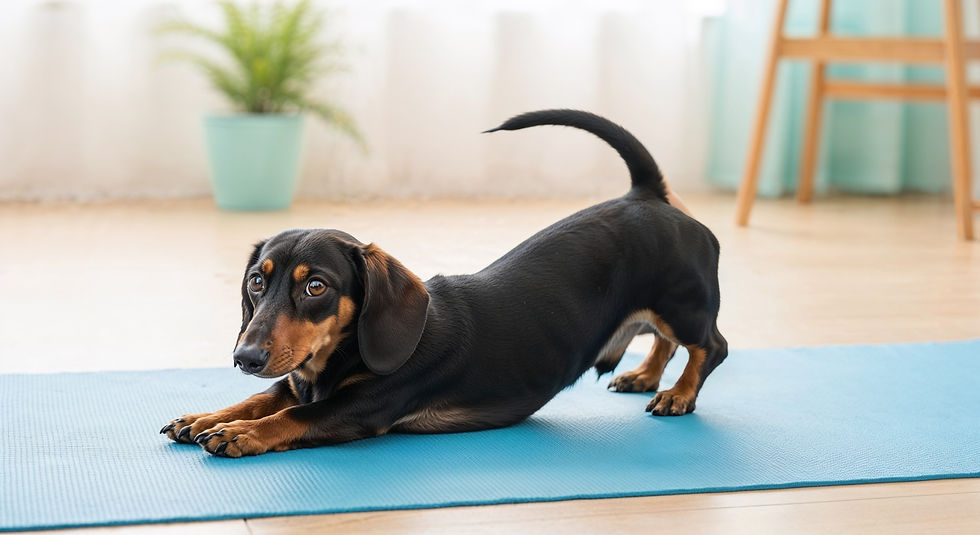It’s All About The Paws
- petsonthebay
- Aug 20, 2025
- 4 min read

Almost every morning, my pup wakes me up by the sound of her licking her paws. For me, honestly, it’s a little worrying.
For her, I’m sure it's excruciating.
What’s a pet parent to do?
So many of our clients at PETS have this same pup concern. When pet parents ask us what they should do, we can only suggest this;

1- Talk to your vet
Allergies and any type of skin condition are absolutely something you need to talk over with your vet first. We understand, as pet parents ourselves, that one visit to the vet can cost a lot. Too much lately it seems. Unfortunately, until we rule out with our vet any medical skin and coat conditions, or even something more complicated that might be happening, any home treatments may only have adverse reactions for them. What pet parents may try to do as quick fixes may sometimes only even escalate their pet’s issues.
So, we suggest finding a reputable vet. Listen to their diagnosis and then consider your treatment choices. You do have choices. If you don’t have a vet or are looking for one in the area, contact our salon and we can help you find one for your pet.
THEN
2- Get a second vet opinion if needed.
Again, consider all the treatment choices/differences and decide what works best for your pet and your family.
AND/OR
3- Look into holistic treatment, if possible.

A certified holistic vet that uses more organic products and treatment plans over pharmaceuticals may be a better option depending on the severity of your pet’s needs.
AND THEN
4- Ask your vet if you should try using wellness preventatives and products at home.
Only consider this option if you rule out that the vet diagnosis alone just isn’t working effectively. If you're consistently noticing that your pet may have allergies and that their skin and coat condition is changing or worsening, do your research. Understand what other at home preventative measures and products might be right for them.

PETS Product Recommends:
The point is… you have choices about how to care for your pet’s healthcare and wellness allergy needs.
In the meantime, try to understand WHY your pet may be excessively licking.
Consider WHERE they are licking.

1- The Paws- itchy, red paw pads may be;
Food allergies; just like humans, pets in Florida have so many allergies- learn more. Consider changing their diet.
Dermatitis of the paws; can be caused by other allergies to a number of things, including:
Dust
Grass
Trees
Mold
Insects
Weeds
Lawn treatment chemicals
Or worse case scenario, it could be Parasites;
A Newsweek Article noted that; “Occasionally, parasite eggs like those from roundworms and hookworms can stick to paws, and when this happens, they can cause nasty infections in both pets and people, so on top of cleaning their paws, you should always make sure to protect your pup with monthly or periodic de-wormers.”
So this is not necessarily a reason to be freaked out. Just something to consider. If you are concerned about your pet’s paws after walks, just wash them…it's that simple. If it becomes chronic, talk to your vet about ways to prevent exposure to parasites.
Finally, paw licking can be a sign of a more complicated health problem or most frustratingly, a behavioral problem like boredom or anxiety. If it’s happening too often, again, ask your vet.
Find a dog trainer in NSB to help curb excessive habits.

2- The Toe Nails- dry, brittle and/or infected nails;
Pet Md Recommends: A simple nail trim could solve the problem. Omega-3 fatty acids and other dietary supplements can also help strengthen your dog’s coat and nails, leading to less licking and irritation of the nail and nailbeds.

3- Foreign objects- in, on and around the paw and nail area;
Keep in mind that injuries such as bee stings, cuts, torn nails, a blister, a stone or thorn stuck between the pads, or other small injuries can also irritate your dog’s paw.
So, we’ve considered the where on the paws, now to look at WHAT we can do as pet parents to soothe our pets through these excruciating licking moments.
Our furry family members are always around us. Just notice when their habits change or worsen. Ask your vet what supplemental care and wellness products you can use at home to help treat and prevent their itchies and lickies.

Natural Solutions for at home pet allergy prevention; Oatmeal Baths, Apple Cider Vinegar Rinse, Coconut Oil, and Aloe Vera.
Begooddog.com suggests the following;
Clean your dog’s paws after outdoor walks. Use a damp cloth or paw wipes to remove pollen, dirt, and allergens that can exacerbate reactions.
Limit Outdoor Time on High-Pollen Days: Pay attention to weather reports, especially during high pollen counts. Reduce outdoor playtime during these days to decrease exposure to allergens.
Maintain a Clean Living Environment: Regularly vacuum your home to remove potential allergens. Use air purifiers to cut down on airborne irritants.
Change Dog Bedding Frequently: Wash your dog’s bedding weekly. Use hypoallergenic detergents to avoid further allergic reactions.

PETS always recommends that regular Bathing and Grooming can help prevent skin and coat issues caused by allergy irritants. Ask your Pet Stylist on your next visit how often your pup should be bathed and groomed and if they can suggest a specialty shampoo and conditioner that helps to soothe allergy symptoms.
As worrying and sometimes annoying excessive licking can be, our first reactions to our pets may be to scold them for it. Simply remember though that this behavior is what they instinctively know how to do to try and heal themselves.
When it’s all about the paws, do what you can to comfort and reassure your pup that they are loved and taken care of. And this alone is the best pet parent thing you can do.






Comments